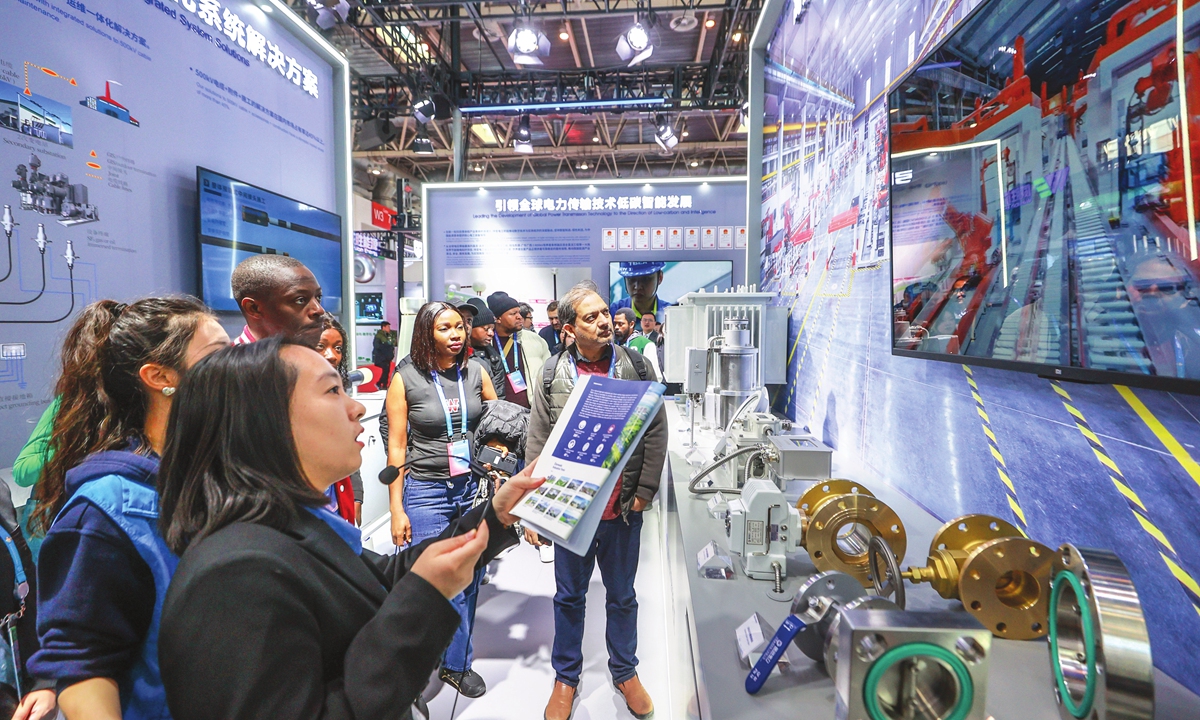
Foreign visitors tour the first China International Supply Chain Expo in Beijing on December 2, 2023. Photo: cnsphoto
Exhibitors to the first China International Supply Chain Expo (CISCE), just concluded in Beijing, signed about 200 business deals and cooperation agreements, worth more than 150 billion yuan ($21 billion).
Despite pressure from some Western countries calling for "decoupling" or "de-risking," the event showcased how multinational businesses, including foreign companies, voted to maintain closer economic ties with China.
The supply chain-themed CISCE was held in the Chinese capital city of Beijing from November 28 to December 2, attracting a total of 515 domestic and foreign exhibitors. Approximately 26 percent of the exhibitors were from overseas, representing 55 countries and regions, the Global Times learned from the China Council for the Promotion of International Trade (CCPIT).
The first CISCE attracted more than 150,000 visitors, of whom the number of purchasers and business visitors surpassed 80,000, Zhang Shaogang, Vice Chairman of CCPIT, said on Saturday during a press conference marking the closing of the expo.
Wide spectrum of attendeesIn addition, more than 1,100 representatives from a wide spectrum of industries, from 90 countries and regions as well as international organizations attended the CISCE event.
"Some exhibitors said that they received more than 10,000 visitors per day. Over one third of the exhibitors had set up direct contact with more than 10 business partners at the CISCE," said Zhang.
Inner Mongolia Jishuo Technology Co Ltd is one example. The company is a supply chain service provider for intelligent animal husbandry and has already signed up to participate in the second CISCE.
"We had a harvest beyond expectations at this CISCE, which enabled small and medium-sized enterprises like us to have direct contact with large corporations. Therefore, we immediately signed up to attend the second CISCE," Zhao Yun, vice general manager of Jishuo Technology, told the Global Times on Friday.
According to Zhao, there are no expos comparable to the CISCE that allows the company to showcase a holistic supply chain service.
"At other exhibitions, we used to only display our intelligent farm or our data center, which are part of our services. Now that we can really show our specific products at the CISCE, and some of our target customers, such as Shenzhen Agricultural Power Group and CITIC Group, came straight for us and we have signed some deals," said Zhao.
Industry-leading companies such as Sinopharm have also signed up to be present at the second CISCE in 2024.
In an exclusive interview with the Global Times during the CISCE, Ju Jingjin, President of the Biological Products Division at Sinopharm, said that the CISCE has brought together many participants in the health industry supply chain from home and abroad, creating good opportunities for international cooperation
"In today's era of integrated growth, it is difficult for a single company to develop behind closed doors. The sharing of information has become indispensable. The CISCE provides us with a high-level cooperation platform to achieve information exchanges, which helps us better overcome information barriers and enhance the transparency and synergy of the supply chain," said Zhu.
Sinopharm and GE Healthcare, a US multinational medical tech company, jointly erected a stand at the first CISCE. They have cooperation in medical device manufacturing in the past years, representatives from both firms told the Global Times.
'Decoupling' is not optionThe launch of the CISCE came amid some Western politicians' voices for "decoupling" or "de-risking" from China, particularly from Washington. The mindset suppressing China's high-tech sector among the politicians hasn't really faded.
Recently, US Commerce Secretary Gina Raimondo urged lawmakers, Silicon Valley and US allies to stop China from obtaining high-end semiconductors and cutting-edge technologies, according to media reports, which echoes the "decoupling" calls.
Some in the US media circle are also turning a blind eye to the needs for cooperation not rivalry between China and the US.
However, the Global Times learned at the CISCE that many exhibitors are already preparing to participate in the second expo next year, and have proposed to expand their exhibition areas, as Lin Shunjie, chairman of the China International Exhibition Center Group, a co-organizer of the CISCE, said on Saturday at the press conference.
On Friday, a total of 44 Chinese and foreign enterprises signed up to participate in the second supply chain expo, including SAP, GE Healthcare, TCL, Winner Medical, iFLYTEK and Sinopharm, the CCPIT said.
Lin said that many multinationals that did not attend the first CISCE expressed their strong willingness to attend the second edition in 2024. Business councils and associations of the US, the UK, France and Canada, among others, said that they will organize larger delegations to attend the second CISCE.
Diverging from the attempts to build a closed "small courtyard with high walls" in the US, the expo embodies China's steady adherence to opening-up that has remained unchanged despite facing external challenges, Gao Liankui, a Beijing-based economist, told the Global Times on Sunday.
"In essence, the uniqueness and resilience of China's supply chain lies in its comprehensive nature, encompassing economies of scale, effective cost control and growing technological maturity across the whole production chain," Gao said, calling for the US to drop the "high wall" mindset and seek cooperation while not rivalry for the benefit of the American and Chinese people.




